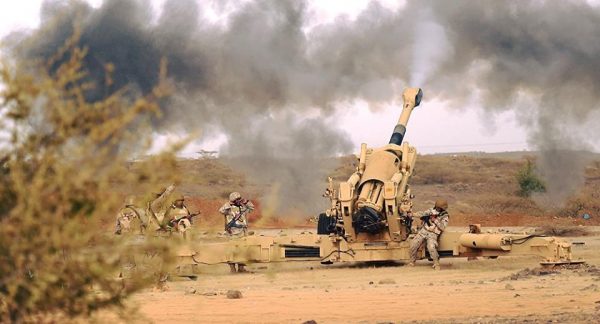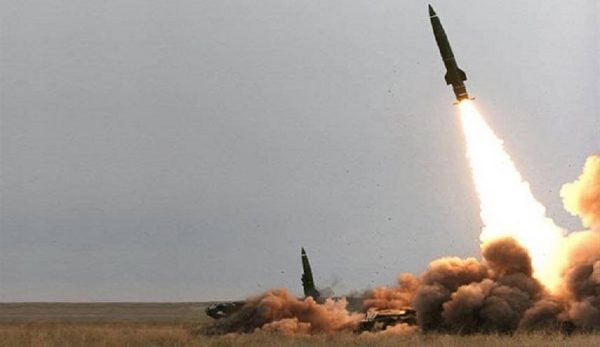Several US lawmakers are seeking to end US support for the Saudi Arabian-led coalition in Yemen unless the kingdom takes “urgent steps” to reduce the enormous toll of human suffering in the war-ravaged nation. For months, a bipartisan group of lawmakers has been pushing legislation that would require the State Department to regularly certify that Saudi Arabia is taking urgent steps to end the Yemen conflict and ease the humanitarian crisis there—steps that would include lowering the risk to civilians.
In a recent Senate Foreign Relations hearing, several senators presented criticism of ongoing American support for the Saudi-led campaign and the detrimental impact it is having on the country. Paul Young, a Republican from Indiana, decried the “worsening humanitarian crisis” and highlighted the lack of stability in the country as a security threat to other US allies and the region as a whole. Another participant, Democrat Chris Murphy of Connecticut, called out the excessive Saudi strikes in Yemen, claiming the kingdom executes an average of 15 sorties a day in the country. Democrat Jeanne Shaheen of New Hampshire summed up the position of the faction: “The Senate has yet to take decisive action to influence the Saudi-led military operations and protect innocent civilians in Yemen […] it’s long past time to send a strong message to Saudi leadership that we have high expectations for our allies, particularly those who are benefiting from US military support.”
Regarding the humanitarian crisis at least, these lawmakers certainly have facts to back up their position. The conflict in Yemen has left an estimated 10,000 civilians dead, 75 percent of the population in need of aid, and 8 million on the brink of starvation as cholera ravages Yemen’s cities.
The clamoring by Senators elicited pushback from the administration. Ambassador David M. Satterfield, the State Department’s Middle East envoy, told the panel of senators that the US assistance to the Saudis “supports important US national security and diplomatic objectives” in securing the region, and that pulling material and logistical backing would endanger those interests.
The Ultimate Conundrum
Saudi Arabia, along with other Sunni Arab states, has had US backing since intervening in Yemen’s civil war in 2015 to support the country’s president and counter-rebels backed by Shiite Iran.
From the very beginning, the US has been uneasy about its support. To be sure, America has thrown in substantial support for Saudi Arabia, including providing them with Patriot anti-missile systems to defend their population centers, refueling Saudi jets flying back and forth from operations, and using its navy to help protect areas around the Saudi coast from rebel maritime forces. Intelligence and reconnaissance operations have also been a regular feature of US-Saudi cooperation.
But the US has stopped short of becoming a full-fledged member of the Saudi coalition. This has been largely due to the fact that America simply cannot sign off on the Saudi approach to dealing with the Yemen problem.
In many ways, the US involvement in the Yemen conflict mirrors its commitment in Syria. In both cases, the sides that oppose each other are not ones that the United States can back fully. This puts American policymakers as well as the administration in a precarious situation: How to intervene in a conflict in which there are serious US interests at stake, but where both of the warring parties are contemptible.

Typically taking part in a conflict means, well, supporting one of the sides. But this is becoming increasingly difficult when it comes to conflicts in the Middle East, as these wars are becoming more and more complex, with a huge variety of actors and interests at play. Becoming involved no longer has straightforward consequences, but rather a un-navigable web of outcomes that can quickly expand beyond the parameters of control. Add to this phenomenon a constantly probing international media apparatus that highlights the faults and crimes of all the players, and it becomes nearly impossible from a strategic and political perspective to engage in any regional schism.
Interests at Stake
While the Yemeni civil war has its share of complexity and horror, it is impossible for the US to simply ignore its interests that are affected by the ongoing fighting in the country. This is really the point Ambassador Satterfield was trying to get across in his response to senators. So the administration must walk the tightrope: Figure out how to remain involved enough in order to be in a position to protect interests and advance objectives, but at the same time not enable or encourage intolerable behavior on the part of the coalition.
In addition to the humanitarian element, there are two other elements America cares about in terms of the civil war’s outcome.
First is the Iranian factor. The Islamic Republic has taken advantage of the Houthi revolt against the Yemen government to project itself into another country neighboring rival Saudi Arabia. Iran has provided the rebels with support at every level, including arming the Houthis with the long-range missiles that continue to threaten the Saudis. A Houthi victory would mean the emergence of a militant power in a vital geographic location (in proximity to both the Middle East and North Africa) with Iranian patronage.
The second is that more regional security externalities have been created by this war. In the vacuum created by conflict, groups such as Al Qaeda in the Arabian Peninsula (AQAP) and ISIS branches, or provinces, have found space to thrive.
The urgency of this particular issue is that Yemen has been a hotbed of jihadist groups for years and has always offered opportunities for such groups to expand, even in the years preceding the civil war. Yemen was one of the earliest countries to be targeted by the US when it opened the War on Terror. Between 2002 and 2016, some 127 confirmed US strikes took place in Yemen targeting various militant groups. The strikes peaked in 2012, and then decreased substantially. Since the start of the current civil war, strikes have risen again. Nearly 60 sorties were executed by drones and manned aircraft since the beginning of 2017. The US is working hard on containment when it comes to these groups. It does not want the lawlessness brought by rebel incursions to spread and thus open the door for the consolidation of territory by jihadists.
Asset or Liability?
The Saudi leadership are not foolish.
For one, they read the news. The American political process is largely transparent and they understand what considerations the administrator must contend with. Thus the Saudis will try to paint themselves as both the very answer to America’s concerns in Yemen and suffering from the exact problems the US is trying to address there.
The Saudi coalition, for instance, has been reporting on the targeting of terror cells in Yemen—even ones that are not directly connected to the civil war. Saudi officials reported on Thursday, April 19, that coalition forces had eliminated two Al Qaeda leaders during an engagement in the southern Abyan Province. The two men, Murad Abdullah Mohammed al-Doubli and Hassan Basurie, were described by officials as “the most dangerous leaders” of Al Qaeda in the Arabian Peninsula, or AQAP.

Saudi Arabia has also begun investing heavily in the humanitarian side in Yemen. The Saudis have long received flack from the international community for perpetuating the human crisis by blockading Yemen. Now the kingdom is receiving recognition for supporting the effort to alleviate the suffering in the country. The United Nations International Children’s Fund (UNICEF) recently commended Saudi Arabia for substantial donations toward disease prevention and treatment in Yemen. The donations will reportedly also provide support for the water and sanitation sectors in the country.
What these reports should signal is that the Saudis are at least willing to respond to US concerns with the ongoing fighting in Yemen (no doubt directly connected to the more “cooperative” policy attitude of the moderate-oriented Prince Muhammad). How much this will quell the concerns of impatient lawmakers is difficult to tell. At the very least give the administration something with which to make a case—that the Saudis can be a partner and not just a liability.
















